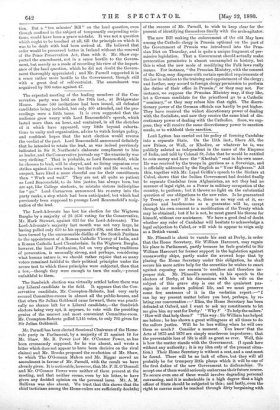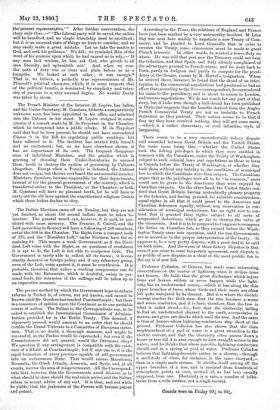Mr. Plimsoll is about to vacate his seat at Derby,
in order that the Home Secretary, Sir William Harcourt, may regain his place in Parliament, partly because he feels grateful to Sir- William Harcourt for former support in the legislation against unseaworthy ships, partly under the avowed hope that by placing the Home Secretary under this obligation, he shall secure his more active help for the securities he wishes to enact against exposing our seamen' to needless and therefore im- proper risk. Mr. Plimsoll's. account, in his speech to the- electors of Derby, of his discussions with his wife on the subject of this grave step is one of the quaintest pas- sages in our modern political life, and we must preserve some feu. sentences of it in the verbatim report :—" I can lay my present matter before you best, perhaps, by re- lating.our conversation Eliza, the Home Secretary has been defeated at Oxford, and I want to ask my constituents to let me give him my seat for Derby.' 'Why?' ?" To help the sailors: 'How will that help them?' This way: Sir William has helped me before ; he has shown a great willingness at all times to do the sailors justice. Will he be less willing when he will owe them so much ? Consider a moment. You know that the Acts of 1875 and 1876 are simply murderous impostures ; that the preventable loss of life is still as great as ever. Well, this is how the matter stands with the Government. (I speak here without any authority ; it is my idea only of the present situa- tion.) Their Home Secretary is without a seat, and a seat must be found. There will be no lack of offers, but they will all probably be for trumpery little places which it will be one of the first duties of the new Government to disfranchise. To accept one of them would seriously embarrass their future course. To secure even one of these would involve degrading personal canvassing, and it is undesirable in a high degree that a high officer of State should be subjected to this ; and lastly, even the right to canvas must be reached through dirty bargaining with the present representative.'" After further conversation, the story ends thus :—"‘The Liberal party will be saved, the sailors will be benefited, and no single friendship need be sacrificed ; but it is an unusual state of things we have to consider, and we may easily raake a great mistake. Let us take the matter to God, and seek hie guidance.' We did ; we reminded Him of the word of his promise upon which he had caused us to rely,—` If Liry man lack wisdom, let him ask God, who giveth to all men liberally, and npbraideth not.' And when we rose, the path of duty wig as clear and plain before us as a turnpike. We looked at each other ; it was enough.* That is, we believe, a perfectly true representation of Mr. Plimsoll's political character, which, if in some respects that .of the political fanatic, is dominated by simplicity and inten- sity of purpose to a very unusual degree. No wonder Derby was taken by storm.



































 Previous page
Previous page